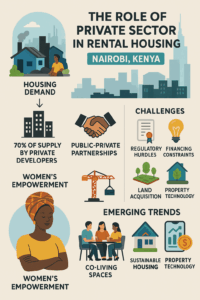The Role Of Private Sector In Rental Housing-Nairobi, Kenya
| Download Document | |
| Document Type: | General |
| Publish Date: | October 15th, 2014 |
| Primary Author: | Edward Crathey |
| Edited By: | Tabassum Rahmani |
| Published By: | Edward Crathey – African Rental Housing Conference |
Introduction
The Role Of Private Sector In Rental Housing Nairobi, Kenya’s capital, faces a significant housing deficit, particularly in the rental sector. With an annual demand of 250,000 housing units and a supply of only 50,000, the shortfall exceeds 2 million units. Private developers contribute approximately 70% of the housing supply, underscoring their pivotal role in addressing this gap.
This presentation is about The Role Of Private Sector In Rental Housing Nairobi, Kenya. Problem. The demand for TO LET mixed commercial and residential units for floating Middle IS HUGE Definition: Mid-sized commercial space in the form of bedsitters and small shops within the Nairobi Metropolitan that is conducive for growing small business.

1. The Role Of Private Sector In Rental Housing, Market Dynamics and Demand Pressures
1.1 Urbanization and Population Growth
Nairobi’s urban population grows at an annual rate of 4.2%, intensifying the demand for affordable rental housing.
1.2 Rising Rental Costs
Over the past decade, apartment rents in Nairobi have quadrupled, with average rents for one to three-bedroom units reaching approximately KES 84,709.
1.3 Income and Affordability Challenges
Many Nairobi residents spend about 40% of their income on rent, surpassing the recommended one-third threshold. This financial strain highlights the urgent need for affordable rental solutions. Business Daily Africa
2. The Role Of Private Sector In Rental Housing Sector Contributions
2.1 Housing Development
Private developers are instrumental in constructing rental units, particularly in urban areas. Their involvement is crucial in bridging the housing deficit.
2.2 Innovation in Construction
Adoption of modern construction technologies, such as prefabrication and modular construction, by private developers has led to cost reductions and faster project completion times.
2.3 Public-Private Partnerships (PPPs)
Collaborations between the government and private sector, like the Ngara Housing Project, have facilitated the development of affordable housing units, leveraging the strengths of both sectors. motherwellhousing.com
3. Challenges Faced by the Private Sector

3.1 Regulatory Hurdles
Complex regulatory environments can deter private investment. Simplifying legal procedures and ensuring transparency are essential to attract more private partners.
3.2 Financial Constraints
High construction costs and limited access to affordable financing options pose significant challenges for private developers aiming to build affordable rental housing.
3.3 Land Acquisition Issues
Securing land for development in Nairobi is often fraught with challenges, including high costs and legal disputes, which can delay or derail housing projects.
4. Emerging Trends In The Role Of Private Sector In Rental Housing
4.1 Co-Living Spaces
Co-living arrangements are gaining popularity among young professionals and students, offering affordable, community-focused housing solutions with shared amenities.
4.2 Sustainable Housing
There’s a growing demand for eco-friendly homes featuring solar panels, rainwater harvesting systems, and energy-efficient designs, driven by both environmental concerns and cost savings.
4.3 Technological Integration
The adoption of property management technologies, including automation and digital payment systems, is enhancing efficiency and reducing revenue losses for landlords.
5. Case Studies
5.1 Tatu City
Tatu City, a privately-owned “startup city” on Nairobi’s outskirts, exemplifies successful private sector involvement in urban development, offering high-quality infrastructure and housing options.
5.2 Le’Mac and Cytonn Towers
These high-rise developments in Nairobi showcase the private sector’s role in providing luxury rental options, catering to the city’s growing middle and upper classes. Wikipedia
Conclusion
The private sector plays a crucial role in addressing Nairobi’s rental housing challenges through development, innovation, and partnerships. However, to maximize its impact, there must be concerted efforts to overcome regulatory and financial hurdles, promote sustainable practices, and ensure affordability for all income levels.
